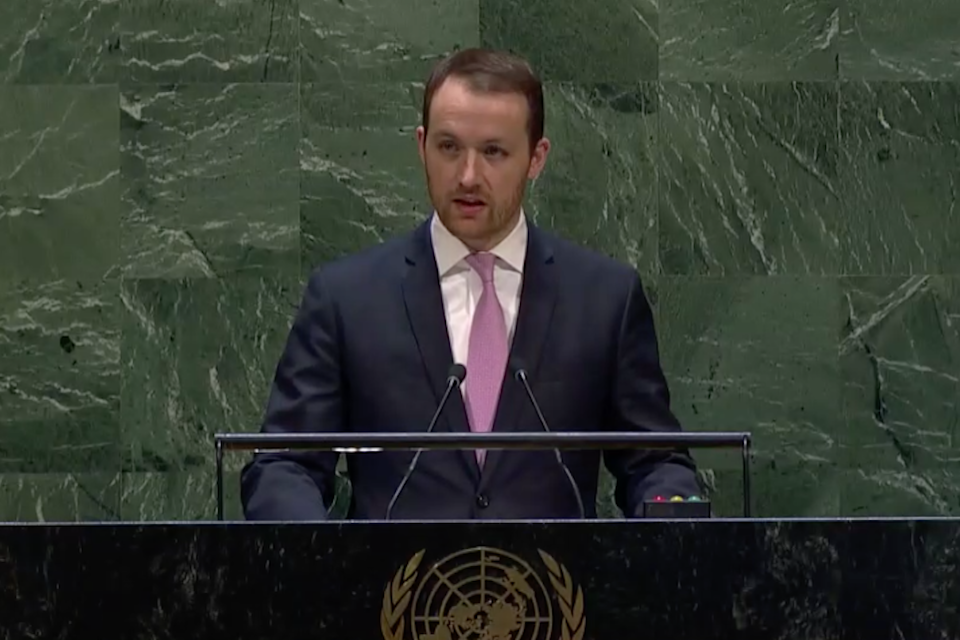Standing behind Ukraine and supporting Ukrainian sovereignty
Statement by Mungo Woodifield at the UN General Assembly

The United Kingdom welcomes this discussion on the situation in Ukraine. I would like to start by reiterating the United Kingdom’s unwavering support to Ukraine’s sovereignty, independence and territorial integrity, including within its internationally recognised borders and territorial waters.
Madam President, today we remember those who tragically died during Ukraine’s 2014 Euromaidan protests. The United Kingdom assures the families who lost loved ones that their sacrifice is not forgotten.
Today also marks six years since Russia seized the Autonomous Republic of Crimea and the city of Sevastopol from Ukraine. On 16 March 2014, Russian ‘de-facto’ authorities in Crimea organised a so-called ‘referendum’. On 18 March, President Putin signed a treaty which formalised Russia’s illegal acquisition of Crimea and Sevastopol.
Let us be clear: by forcibly seizing 10,000 square miles from Ukraine, Russia broke the first principle of international law, that countries may not acquire territory or change borders by force. Russia’s actions flagrantly violated its own international commitments including in Article 2 of the United Nations Charter, the Helsinki Final Act and the Budapest memorandum.
Through Resolution 68/262, the UN General Assembly responded to Russia’s actions by affirming Ukraine’s territorial integrity within its internationally recognised borders and the illegality of Crimea’s change of status.
Madam President, the UK’s position is clear: we do not and will not recognise Russia’s illegal annexation of Crimea. Crimea is part of Ukraine and we cannot ignore Russia’s attempt to redraw boundaries in Europe.
The Russian Government continues to commit serious human rights violations beyond its borders, on the Crimean peninsula. The widespread persecution of ethnic and religious groups, including Crimean Tatars, must stop.
The release of Oleh Sentsov and other political prisoners, while welcome, was long overdue. It is appalling that approximately 89 Ukrainian political prisoners remain in detention in Crimea. Some are denied urgent medical assistance: Arsen Dzhepparov for his hearing, Viktor Shur (SHOOR) for his heart. The UK calls on Russia to immediately release all Ukrainian political prisoners.
It is deplorable that Russia continues to ignore General Assembly resolutions calling for the UN High Commissioner for Human Rights to visit Crimea, to provide a full, independent assessment of the human rights situation. We call on Russia to grant access, in line with UN General Assembly Resolution 73/263.
The United Kingdom is deeply concerned about Russia’s ongoing militarisation of Crimea and the Sea of Azov. In line with the General Assembly’s resolution 74/17 on the militarisation of Crimea, the UK calls on Russia to withdraw its military forces from the peninsula and to stop restricting access to the Sea of Azov.
Russia’s actions in November 2018 violated the United Nations Convention on the Law of the Sea, and had no basis in international law. It is inexcusable that Russia persists with daily restrictions on Ukrainian vessels passing through the Kerch Strait. This is clearly a brazen attempt to de-stabilise Ukraine’s economy.
The international community must continue to stand united and focus on Russia’s behaviour and consolidation of its illegal annexation of Crimea through the railway bridge across the Kerch Strait and local elections on the Crimean peninsula.
Madam President, the Russian-led conflict in eastern Ukraine remains volatile. Russia has incited and supported military activity by armed formations, including through the deployment of Russian troops and military equipment on Ukrainian territory. As recently as this week, there has been a sharp increase in ceasefire violations near to the Zolote disengagement area, with heavy weaponry proscribed under the Minsk Agreements, which has caused further casualties. The Ukrainian people deserve peace and we will continue to hold Russia to account to this end.
The United Kingdom condemns continuing threats to the OSCE Special Monitoring Mission; Russia’s repeated refusal to allow the SMM to implement its mandate within non-government controlled territories threatens the security of Ukraine and the wider region. We call on Russia to ensure safe, unconditional and unimpeded access in areas outside Ukraine’s effective control.
The continued fighting is having a tragic impact on the lives of ordinary men, women and children. Over 13,000 people have now lost their lives, almost 30,000 have been injured, 3.4 million are in need of humanitarian assistance and approximately 1.4 million are registered as internally displaced people. Russia bears a heavy responsibility for the ongoing suffering.
Let us be clear: this conflict is not frozen. Russia created this conflict and Russia continues to use its influence over the separatists to service its agenda: attempting to suppress Ukraine’s independence. In contrast, President Zelensky has shown a clear commitment to end the conflict.
The United Kingdom calls on Russia to abide by its Minsk Agreement commitments and to deliver on the actions agreed at the Normandy Format Summit in Paris on 9 December: a full and comprehensive ceasefire; further disengagement; further prisoner exchanges; and full and unimpeded access for the OSCE Special Monitoring Mission and humanitarian organisations to the Non-Government Controlled Areas. This is the only way to end the fear and suffering of ordinary people in Ukraine.
Madam President, the United Kingdom once again calls on the international community to stand behind Ukraine, united, and oppose Russia’s continued attempts to destabilise Ukraine, undermine her sovereignty and steal her territory.
Thank you.